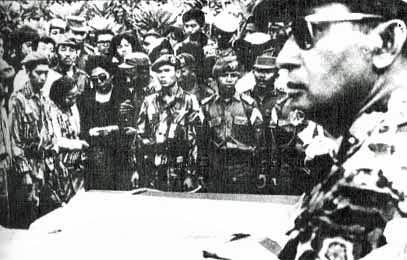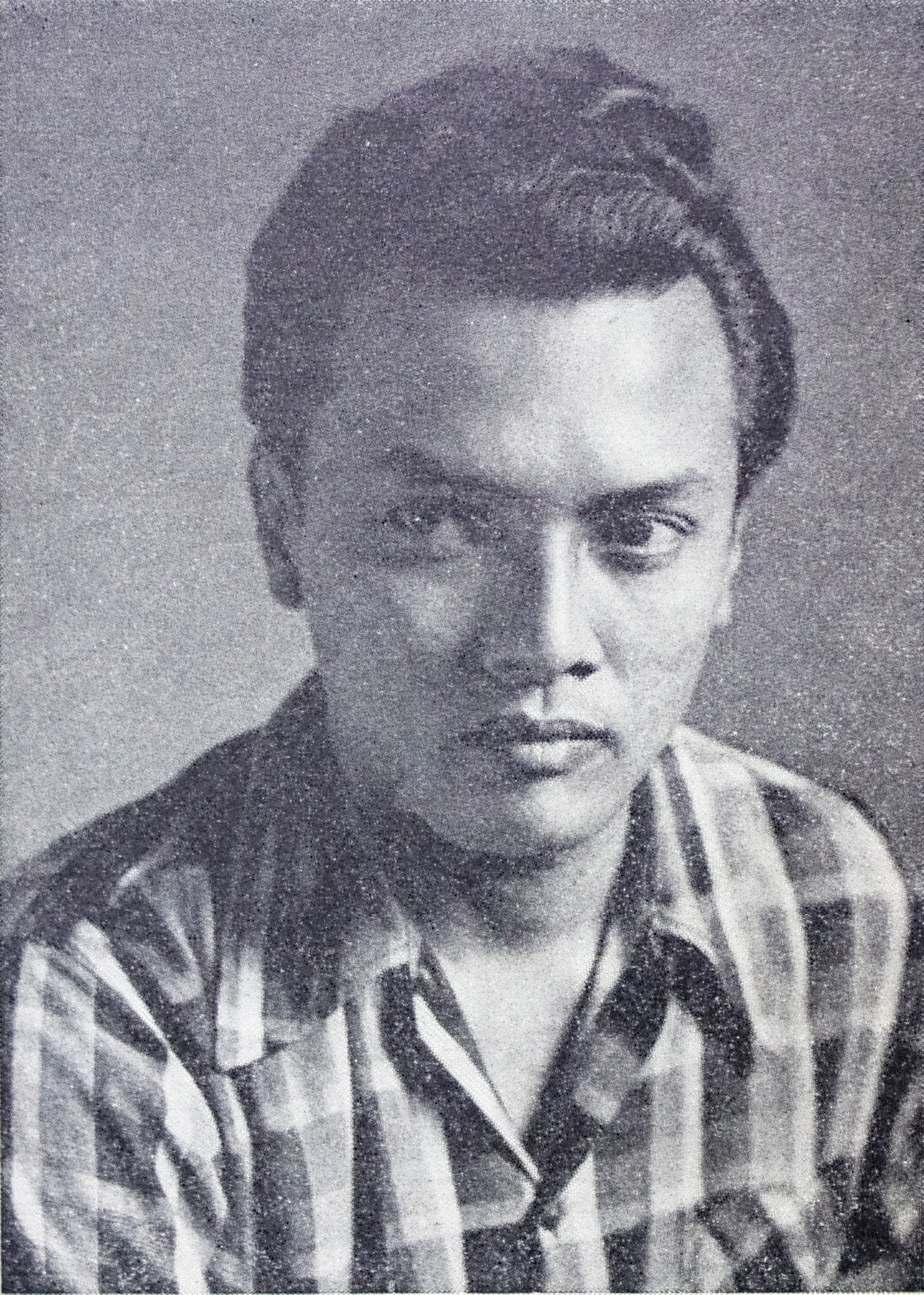|
Usmar Ismail
Usmar Ismail (20 March 1921 – 2 January 1971) was an Indonesian film director, author, journalist and revolutionary of Minangkabau descent. He is widely regarded as the native Indonesian pioneer of the cinema of Indonesia. Biography Ismail was born in 1921 in Bukittinggi, West Sumatra. His father, Datuk Tumenggung Ismail, taught at the medical school in Padang. His brother Abu Hanifah was also a well-known revolutionary and writer. Ismail attended ASM-A Yogyakarta and later obtained a B.A. in cinematography from the University of California, Los Angeles in 1952. Ismail initially served in the army during the Dutch colonial rule. He served in the Indonesian army in Yogyakarta. During this time, he was a co-founder of a newspaper called ''Rakyat,'' meaning "people" or "populace" in Bahasa Indonesia. He worked as the head of the Indonesian Journalists Association in 1946 and 1947. In 1948, he was arrested while working at national news agency Antara for covering Dutch-Indon ... [...More Info...] [...Related Items...] OR: [Wikipedia] [Google] [Baidu] |
Bukittinggi
Bukittinggi (, Jawi script, Jawi: , formerly ) is the third largest city in West Sumatra, Indonesia, with a population of 111,312 in 2010Biro Pusat Statistik, Jakarta, 2011. and 121,028 in 2020.Badan Pusat Statistik, Jakarta, 2021. An official estimate as of mid 2023 lists a population of 124,047, consisting of 61,949 males and 62,098 females.Badan Pusat Statistik, Jakarta, 28 February 2024, ''Kota Bukittinggi Dalam Angka 2024'' (Katalog-BPS 1102001.1375) The city covers an area of 25.24 km2. It is located in the Minangkabau Highlands, 90 km by road from the West Sumatran capital city of Padang, Indonesia, Padang. The city is completely surrounded by the Agam Regency (Bukittinggi was its regency seat until 1998), making it an enclave and exclave, enclave within the regency, and it is located at , near the volcanoes Mount Singgalang (inactive) and Mount Marapi (still active). At 930 m above sea level, the city has a cool climate with temperatures between 16.1° to 24.9&nbs ... [...More Info...] [...Related Items...] OR: [Wikipedia] [Google] [Baidu] |
Indonesian Journalists Association
The Indonesian Journalists Association (), here inafter known as PWI, is the first professional journalist organization in Indonesia. PWI was established on 9 February 1946 in Surakarta (this date was designated under the New Order in 1985 to become National Press Day). PWI consists of journalists spread all over Indonesia. Currently PWI is led by Margiono as chairman who has served from 2013 to 2018. History The establishment of the PWI organization became the beginning of Indonesia's struggle against colonialism in Indonesia through media and writing. After the establishment of PWI, similar organizations were also established. The organization was the Newspaper Publishers Union (SPS; ) on 8 June 1946. The SPS changed its name to the Press Company Union (SPP; ) in 2011, coinciding with the 65th SPS anniversary. The interest in establishing SPS at that time departed from the idea that the ranks of national press publishers needed to be immediately organized and managed, in its ... [...More Info...] [...Related Items...] OR: [Wikipedia] [Google] [Baidu] |
2nd Moscow International Film Festival
The 2nd Moscow International Film Festival was held from 9 to 23 July 1961. The Grand Prix was shared between the Japanese film '' The Naked Island'' directed by Kaneto Shindo and the Soviet film '' Clear Skies'' directed by Grigori Chukhrai. Jury * Sergei Yutkevich (USSR - President of the Jury) * Chinghiz Aitmatov (USSR) * Zoltán Várkonyi (Hungary) * Luchino Visconti (Italy) * Sergei Gerasimov (USSR) * Karel Zeman (Czechoslovakia) * Mehboob Khan (India) * Joshua Logan (USA) * Leon Moussinac (France) * Roger Manwell (Great Britain) * Francisco Piña (Mexico) * Walieddin Youssef Samih (Egypt) * Jerzy Toeplitz (Poland) * Huang Guang (China) * Michael Tschesno-Hell (East Germany) * Liviu Ciulei (Romania) * Borislav Sharaliev (Bulgaria) Films in competition The following films were selected for the main competition: Awards * Grand Prix: ** '' The Naked Island'' by Kaneto Shindo ** '' Clear Skies'' by Grigori Chukhrai * Special Golden Prize: '' Everybody Go ... [...More Info...] [...Related Items...] OR: [Wikipedia] [Google] [Baidu] |
Proclamation Of Indonesian Independence
The Proclamation of Indonesian Independence (, or simply ''Proklamasi'') was read at 10:00 Tokyo Standard Time on Friday 17 August 1945 in Jakarta. The declaration marked the start of the diplomatic and armed resistance of the Indonesian National Revolution, fighting against the forces of the Netherlands and pro-Dutch civilians, until the latter officially acknowledged Indonesia's independence in 1949. The document was signed by Sukarno and Mohammad Hatta, who were appointed president and vice-president respectively the following day. The date of the Proclamation of Indonesian Independence was made a public holiday by a government decree issued on 18 June 1946. Background The beginnings of the independence movement In 1918, the Dutch authorities in the Dutch East Indies established a partly-elected People's Council, the '' Volksraad'', which for the first time gave Indonesian nationalists a voice. Meanwhile, Indonesian students studying in the Netherlands formed the Perhimpo ... [...More Info...] [...Related Items...] OR: [Wikipedia] [Google] [Baidu] |
Fighters For Freedom
''Warriors for Freedom'' () is a 1960 Indonesian drama film directed by Usmar Ismail. It was entered into the 2nd Moscow International Film Festival where Bambang Hermanto won the Silver Prize for Best Actor. Plot Circa 1947, a platoon led by Letnan Amin (Rendra Karno) receives an assignment to hold a strategically important bridge. These troops are supported by a number of refugees, among them Irma ( Chitra Dewi), a middle-class child cynical about the fight for independence. Amin and Irma are in a secret relationship; Sergeant Major Imron (Bambang Hermanto) also has an interest towards Irma. When Amin is injured, Imron is assigned to lead the troops away from Dutch-held territory, which is accomplished. Corporal Seno (Bambang Irawan) suspects Imron of wanting Amin out of the way to get Irma. In order to prove this suspicion wrong, Imron decides to undertake an operation to free Amin from a Dutch prison camp. Amin is freed, but Imron dies. After they are reunited Irma finally c ... [...More Info...] [...Related Items...] OR: [Wikipedia] [Google] [Baidu] |
Indonesian Mass Killings Of 1965–66
Large-scale killings and civil unrest primarily targeting members and supposed sympathizers of the Communist Party of Indonesia (PKI) were carried out in Indonesia from 1965 to 1966. Other affected groups included alleged communist sympathisers, Gerwani women, trade unionists, ethnic Javanese Abangan, ethnic Chinese, atheists, so-called " unbelievers", and alleged leftists in general. According to the most widely published estimates at least 500,000 to 1 million people were killed, with some estimates going as high as 2 to 3 million.Indonesia's killing fields . , 21 December 2012. Retrieved 24 January 2016. The ... [...More Info...] [...Related Items...] OR: [Wikipedia] [Google] [Baidu] |
New Order (Indonesia)
The New Order (, abbreviated ''Orba'') describes the regime of the second Indonesian President Suharto from his rise to power in 1966 until his resignation in 1998. Suharto coined the term upon his accession and used it to contrast his presidency with that of his predecessor Sukarno (retroactively dubbed the "Old Order" or ). Immediately following the attempted coup in 1965, the political situation was uncertain, and Suharto's New Order found much popular support from groups wanting a separation from Indonesia's problems since its independence. The 'generation of 66' ('' Angkatan 66'') epitomised talk of a new group of young leaders and new intellectual thought. Following Indonesia's communal and political conflicts, and its economic collapse and social breakdown of the late 1950s through to the mid-1960s, the "New Order" was committed to achieving and maintaining political order, economic development, and the removal of mass participation in the political process. The featu ... [...More Info...] [...Related Items...] OR: [Wikipedia] [Google] [Baidu] |
Communist Party Of Indonesia
The Communist Party of Indonesia (Indonesian language, Indonesian: ''Partai Komunis Indonesia'', PKI) was a communist party in the Dutch East Indies and later Indonesia. It was the largest non-ruling communist party in the world before its Indonesian mass killings of 1965–66, violent disbandment in 1965. The party had two million members in the 1955 elections, with 16 percent of the national vote and almost 30 percent of the vote in East Java. At the time, it was the largest communist party in the world after the Chinese and Soviet communist parties. During most of the period immediately following the Indonesian Independence until the eradication of the PKI in 1965, it was a legal party operating openly in the country. Accused of responsibility for the 30 September Movement, 1965 army-led coup attempt, the party was banned by General Suharto in March 1966. History Forerunners The Indies Social Democratic Association (Dutch language, Dutch: ''Indische Sociaal-Democratische ... [...More Info...] [...Related Items...] OR: [Wikipedia] [Google] [Baidu] |
Anak Perawan Di Sarang Penjamun
''Anak Perawan di Sarang Penjamun'' ( Perfected Spelling: ''Anak Perawan di Sarang Penyamun''; literally ''The Virgin in the Robbers' Nest'') is a 1962 Indonesian film directed and produced by Usmar Ismail for PERFINI. Starring Bambang Hermanto and Nurbani Yusuf, it follows a young woman who is kidnapped by a group of bandits, only to fall in love with their leader. The film, adapted from the 1940 novel of the same name by Sutan Takdir Alisjahbana, was repeatedly blacklisted by the Indonesian government and only saw release several years after production ended. Plot Medasing (Bambang Hermanto) is the fierce leader of a group of robbers who joined them after his parents were killed. He and his gang track the movements of a rich merchant (Rd Ismail) and his family, who are returning from a successful business trip. While the family is sleeping in the woods, Medasing and his men sneak into the camp, where they kill most of the porters and merchant. Leaving the merchant's wife be ... [...More Info...] [...Related Items...] OR: [Wikipedia] [Google] [Baidu] |
Darah Dan Doa
''Darah dan Doa'' (; Indonesian for ''Blood and Prayer'', released internationally as ''The Long March'') is a 1950 Indonesian war film directed and produced by Usmar Ismail, telling the story of the Siliwangi Division and its leader Captain Sudarto on a march to West Java. Following Ismail's Dutch-produced '' Tjitra'' (1949), ''Darah dan Doa'' is often cited as the first 'Indonesian' film, and the film's first day of shooting – 30 March – is celebrated in Indonesia as National Film Day. Produced on a budget of 350,000 rupiah and intended to be screened at the Cannes Film Festival, financial difficulties led production of ''Darah dan Doa'' to almost stop before the director received financial backing. After raising controversy for its subject material, the film underwent censorship and was finally released to commercial failure. Retrospective analysis has, however, been more positive, and Ismail has been dubbed the "father of Indonesian film". Plot The Siliw ... [...More Info...] [...Related Items...] OR: [Wikipedia] [Google] [Baidu] |
People's Consultative Assembly
The People's Consultative Assembly of the Republic of Indonesia (, MPR-RI) is the legislative branch in Indonesia's political system. It is composed of the members of a lower body, House of Representatives (DPR) and an upper body, Regional Representative Council (DPD). Before 2004, and the amendments to the 1945 Constitution, the MPR was the highest governing body in Indonesia. In accordance with Law No. 16/1960, the assembly was formed after the general election in 1971. It was decided at that time that the membership of the Assembly would be twice that of the House. The 920 membership of MPR continued for the terms of 1977–1982 and 1982–1987. For the terms 1987–1992, 1992–1997, and 1997–1999 the MPR's membership became 1000. One hundred members were appointed representing delegations from groups as addition to the faction delegates of Karya Pembangunan (FKP), Partai Demokrasi Indonesia (FPDI), Persatuan Pembangunan (FPP), and military (''Fraksi ABRI'', later ... [...More Info...] [...Related Items...] OR: [Wikipedia] [Google] [Baidu] |






